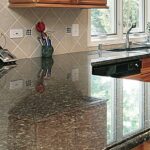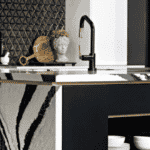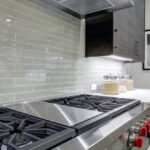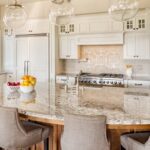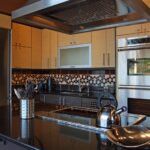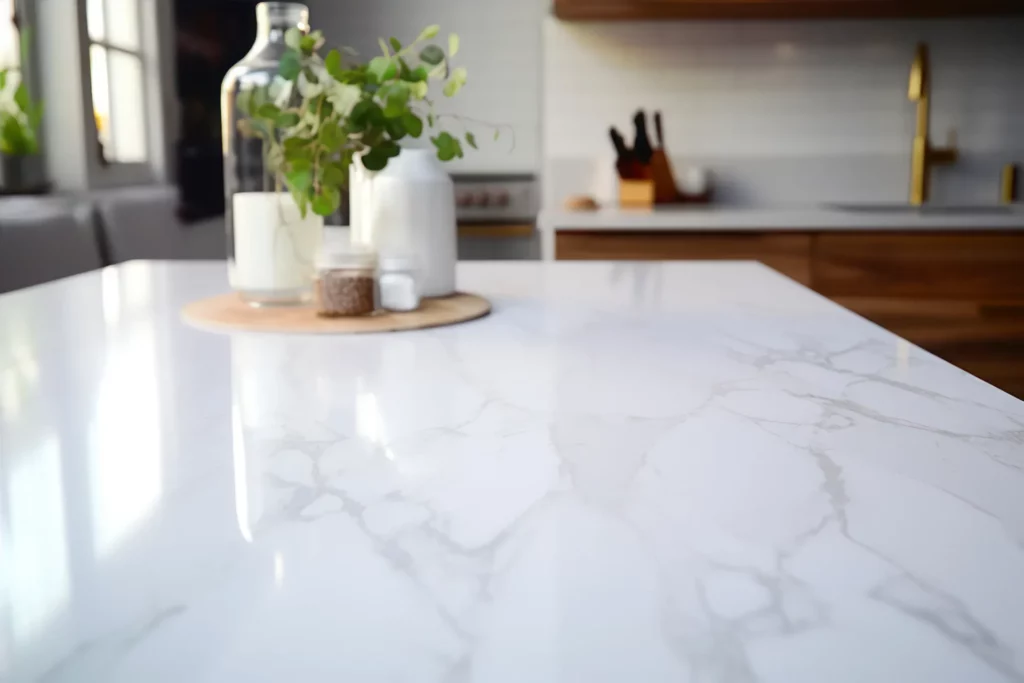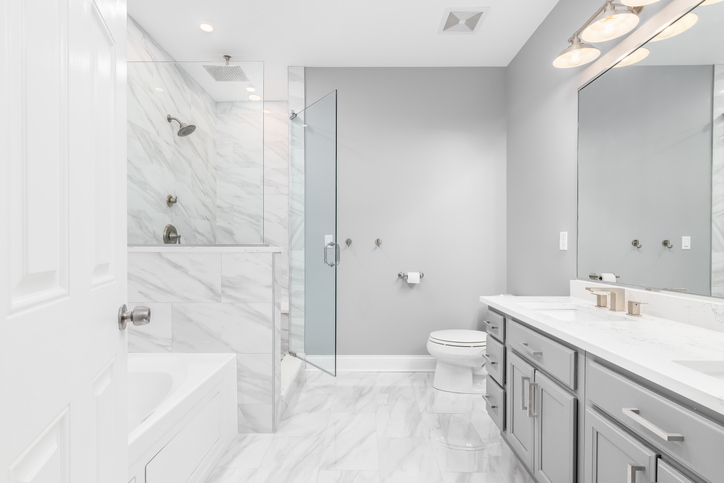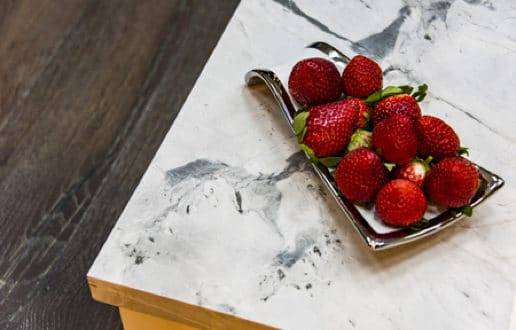Are Quartz Countertops Safe for My Orlando Home?
Introduction
Quartz countertops have become a ubiquitous feature in modern residential kitchens and bathrooms. Several factors contribute to their widespread popularity key factors. These countertops are renowned for their exceptional durability, making them resistant to scratches and chips, ensuring a long-lasting investment for homeowners. Moreover, their aesthetic appeal is undeniable, with a sleek and contemporary appearance that seamlessly complements various interior design styles. The versatility of quartz countertops is one of their most noteworthy attributes. A lot of homeowners in Orlando are choosing quartz countertops for their kitchens or bathrooms. Are they safe?
Overview of Quartz Countertops
They come in a wide range of colors and patterns, enabling homeowners to customize their spaces to their liking. In terms of composition, these countertops are primarily crafted from crushed natural quartz, a durable mineral combined with resins and pigments to achieve the desired coloration and design. This unique blend of natural and synthetic materials grants quartz countertops their distinctive characteristics, making them a favored choice among homeowners seeking style and practicality.
Concerns about Health Risks Associated with Quartz Countertops
While quartz countertops have garnered immense popularity among homeowners, a less-discussed aspect is associated with them that merits attention. Recent years have seen mounting concerns regarding the health risks faced by individuals involved in the manufacturing and fabrication of quartz countertops.
A particular area of concern centers on worker safety within the quartz countertop production industry. Reports have surfaced detailing workers developing lung diseases, notably silicosis, linked to prolonged exposure to airborne crystalline silica dust, a byproduct of quartz countertop production processes. The potential health hazards associated with inhaling such dust particles have raised alarm bells within the industry and among health experts.
Are Quartz Countertops Safe for Homes in Orlando, Florida?
In light of the abovementioned concerns surrounding the health risks of quartz countertop production, a fundamental research question emerges: Quartz countertop safety in Orlando, Florida homes is crucial. Our investigation zeroes in on this central query, explicitly targeting the environmental and residential factors affecting quartz countertop safety in Orlando.
This research endeavor is guided by the intention to explore and assess the potential health risks or safety assurances associated with installing and using quartz countertops in residential settings within the Orlando area. Through studying this critical topic, insights regarding the security concerns involved in choosing and deploying quartz work surfaces in residential areas are provided to help homeowners and interested parties better understand these factors, tailored to the distinct requirements and applications relevant to the Orlando neighborhood.
A Resilient Countertop Material Quartz
Renowned for its durability, engineered stone is often called upon for countertops. A blend of resilient resin and naturally sourced crystals gives quarts impressive resistance to wear and tear. Safe and appropriate for use in various environments, this material is ideal for kitchen, bathroom, and office countertops. Safety first; protecting your quartz countertop matters most.
Though resistant to scuff marks and tears, though susceptible to heat and harsh chemicals, quartz displays remarkable resilience. To ensure effective cleaning, specialists advise following a delicate method involving soft H2O and moderate cleansers. To increase the longevity of a quartz countertop, avoid exposure to scorching surfaces and harmful chemicals. Also necessary to avoid when cleaning surfaces are abrasive materials.
Properties and care needs of quartz countertops will be explored more deeply later..”
This segment will delve further into quartz countertops’ properties and care considerations.
Quartz and Other Materials Performance Chart
| Performance | Eco score rating out of 10 | |||
| Type of Countertop | Stain Resistance | Scratch resistance | Ease of repair | Safety, sustainability |
| Quartz Countertop | Best | Best | Fair | 7 |
| Granite Countertop | Very good | Very good | Fair | 7 |
| Solid Surface | Very good | Very good | Good | 5 |
| Recycled glass | Good | Good | Fair | 8 |
| Marmoleum | Fair | Poor | Very good | 9 |
Advantages of Quartz Countertops
An eco-friendly option that appeals to environmentally minded homeowners, quartz countertops have. With an emphasis on their use in restrooms, this section examines the benefits of food hygiene.
Non-Porous Surface and Food Hygiene:
- Non-Porous Nature: Non-porosity makes quartz countertops highly valued. Without tiny pores or cracks, quartz surfaces have a tightly packed, even arrangement of atoms. Water absorption is something this property naturally resists.
- Bacterial Growth Prevention: Because of their lack of pores/openings, quartz countertops ensure water does not enter and foster bacterial/mold/mildew expansion. – Areas such as kitchens stand to profit significantly from this, given their importance in ensuring proper food cleanliness.
- Ease of Cleaning: Since spills, stains, and meal residuals cannot seep through, the cleansing step becomes much more straightforward. With a quick wipe using warm soap or mild cleaning detergent, most contaminants are removed, resulting in a spotless surface free of germs.
- Reduced Need for Chemical Cleaners: Quartz countertops demand fewer chemicals than their peers on countertops, requiring less chemical intervention than other materials. By implementing eco-friendly practices, this reduction in chemical cleaning agents reduces chemical waste and minimizes exposure to hazardous substances.
- Ideal for Bathrooms: Unlike some other countertop materials that may require harsh chemical cleaners to disinfect and remove stains, quartz countertops typically necessitate minimal chemical intervention. This reduction in the use of chemical cleaning agents aligns with eco-friendly practices by reducing chemical waste and minimizing exposure to potentially harmful substances.
Ideal for Bathrooms and Moist Environments:
- Non-Porous Bathroom Surfaces: Conducive to the growth of mold, bacteria, and mildew are bathrooms due to their humidity and heat. It’s Proven to be an asset in bathroom settings; quartz countertops offer benefits thanks to being non-porous. Because of its uninterrupted and unbroken texture, moisture cannot seep into quartz, thereby creating an environment inhospitable to mold and bacteria growth.
- Easy-to-Clean Bathroom Surfaces: Quartz surfaces in bathrooms are ideal to clean and contribute to a healthy environment. Simple cleaning methods using mild soaps can preserve surface sanitation without harsh disinfectants that could damage the environment.
Cautions for Cleaning:
- Avoid Harsh Chemicals: While quartz is highly resistant to stains and bacterial growth, it is essential to exercise caution when cleaning. Bleach and other abrasive cleaners may permanently stain or damage the resin composite of quartz surfaces, so it is best to avoid them when cleaning.
Are There Potential Health Risks of Quartz?
Quartz, often hailed as a safe choice for home countertops due to its lack of toxic chemicals and NSF certification, has been thrust into a debate centered around safety. While the countertops are generally considered safe, concerns have arisen, casting shadows over the material.
The contentious issue revolves around including an antimicrobial agent, micro-ban, in many quartz products. This additive is intended to thwart the growth of bacteria, and while regulatory bodies have given it their nod, questions linger in the air. The crux of the matter, however, unfolds during the manufacturing process. As quartz is transformed into countertops, minuscule crystalline particles called silica become airborne, infiltrating workers’ lungs—a grave concern.
With time, the impact on the respiratory system becomes palpable. Silicosis, a relentless affliction, diminishes the body’s capacity to absorb oxygen. The prognosis is grim, with some patients resorting to supplemental oxygen and, in dire cases, lung transplants, for there exists no panacea. Silicosis typically emerges after a decade or more of sustained exposure to silica dust, a hazard not to be underestimated. An alarming study from 2012 cited 25 cases in Israel, while Spain grapples with nearly 50 reported instances. What’s most unsettling is the youthfulness of those afflicted; the average age is under 40, with a work history in quartz countertop development spanning 9 to 17 years.
The research indicated that there is no health risk if your quartz countertop is already installed. The main danger comes while manufacturing, cutting, polishing, and working with quartz. Experts say that homeowners are not at risk with installed quartz.
Is Quartz Eco-Friendly or Not?
Evidence suggests that the United States is not immune to this issue. Both OSHA and PEL have indicated that silica dust in most stone fabrication shops exceeds recommended safety levels. With approximately 100,000 workers in these establishments, each one stands on precarious ground. Many manufacturers have taken measures to curtail dust production to combat this looming threat, with dry cutting identified as the prime culprit. The transition to wet cutting has effectively reduced dust levels, offering a glimmer of hope.
This complex issue has made some question the eco-friendly label affixed to quartz. Fortunately, the history of silica dust’s perilous effects is meticulously documented, dating back to the 1930s. The shift towards wet cutting represents a tangible stride towards safeguarding the well-being of workers in the industry. In essence, while quartz countertops may pose minimal risks to homeowners, the tale of their creation carries a sad note—a reminder that the product’s safety is intertwined with the well-being of those who craft it.
Composition of Quartz Countertops:
- Natural Crystals and Resin Blend: Natural Crystals and Resin Blend: -is Made mainly of resin and pigment combined with genuine quartz crystals; Quartz countertops include. Slab formation entails high-pressure, heat, and material combination processes.
Durability and Resistance:
- Exceptional Durability: Due to their natural hardness, quartz crystals are highly valued for their durability. It is one of the hardest minerals in Earth’s crust and is highly resistant to wear and tear.
- Scratch and Cut Resistance: Scratch-resistant and easy-to-clean quartz countertops thrive in high-traffic areas like busy kitchens.
Safety and Suitability for Different Settings:
- Safe for Countertops: Safe and versatile, quartz countertops suit kitchens, bathrooms, and offices alike. -Being impervious to water, these things hinder fungus and germ development.
- Versatility: Quartz surfaces survive routine kitchen and bathroom usage through sheer resilience and toughness. Their combination of style and strength makes commercial offices frequent users.
Maintenance and Care:
- Protection from Heat and Corrosive Chemicals: Though highly resistant to scuffs and slices, quartz countertops have a weakness: heat and chemical attack. With too much heat, thermal shock could happen, causing pottery damage or discoloration over time. Damaging the resin binding of quartz crystals can result from exposure to harmful chemicals such as acidic compounds or alkaline substances.
- Cleaning Recommendations: Expert advice emphasizes the importance of delicate maintenance when keeping quartz countertops looking their best. – To clean daily items, you generally need hot water and a gentle scrubber made of cloth or sponge, correct? Mild cleaning detergents can handle even hardened stains. Surfaces can become damaged by abrasive products, so avoid those things.
- Preventing Permanent Discoloration: To keep the quartz surface looking its best, avoid exposing it to permanent discoloration agents like dyes, pigments, or chemicals. Helping preserve the countertop’s color integrity by avoiding direct sunlight for extended periods, there’s more.
Quartz for Bathrooms & Kitchens
With an emphasis on food safety and wet locations like bathrooms, quartz countertops offer benefits. With no pores or cracks, their surface repels moisture and halts bacteria expansion, making cleanup simpler while decreasing the demand for harsh cleansers. With eco-consciousness in mind, environmentally friendly practices are put into play. The kitchen is also a great place for quartz, as bacteria won’t be able to penetrate into the countertop surface. You can also avoid stains if something spills
Efficiency and sustainability are key factors that drive people toward choosing quartz countertops since they provide durability, safety, and environmental awareness all in one product. A testament to their resilience, homes remain almost unchanged despite time’s passage, a gentle reminder of prioritizing sustainability throughout a product’s lifespan.
Conclusion
Safe for home use, quartz countertops do not contain toxic chemicals, with products in the US typically carrying the NSF certification. For several settings, including kitchens, bathrooms, and offices, quartz countertops are both well-liked and adaptable. These environments require their safety and suitability thanks to their exceptional qualities, including wear and tear resistance and lack of porosity. The key to extending the life of quartz countertops is protecting them from heat and corrosive materials.
Submit Your Questions or Request for a FREE Quote



